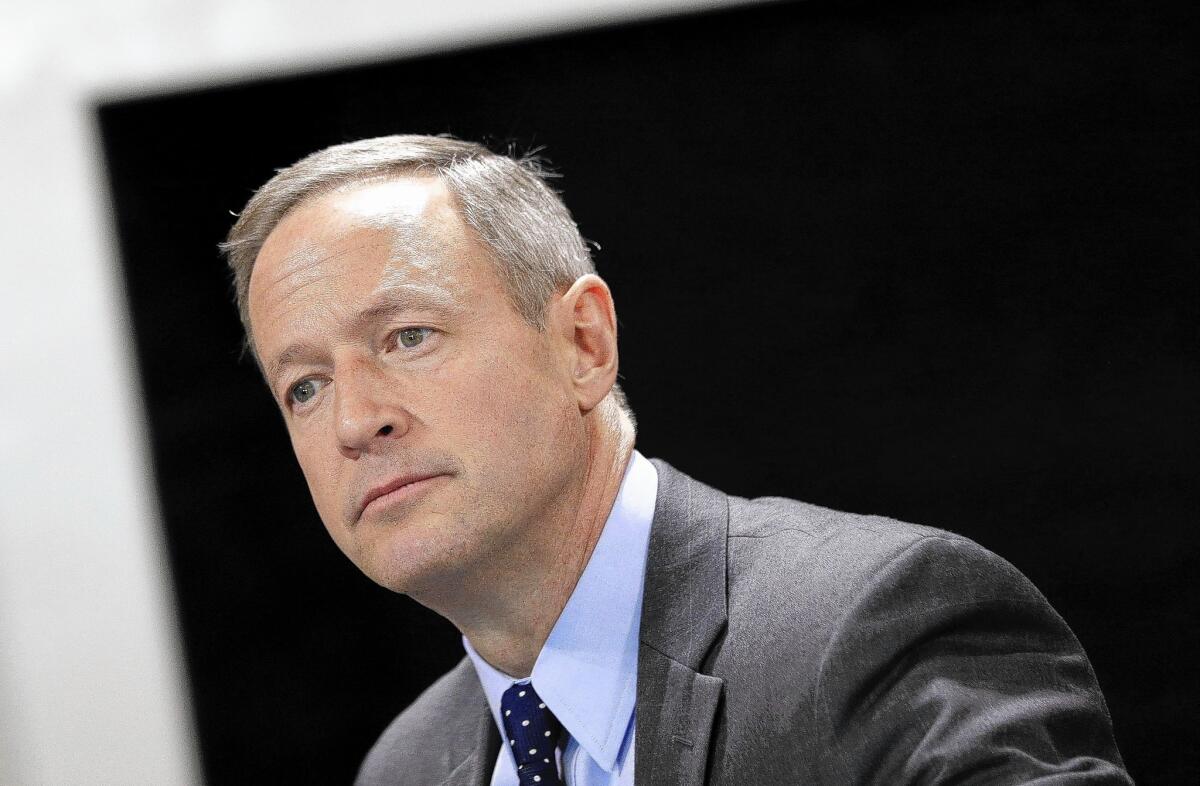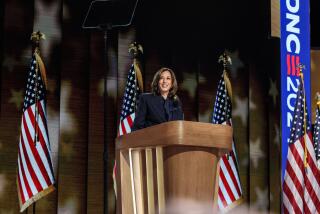Martin O’Malley warms up in Iowa for possible Democratic run in 2016

Reporting from DES MOINES — The visit had all the trappings of a full-fledged presidential campaign: a speech at the state Democratic convention, a pep talk to door-knocking volunteers, breakfast with labor leaders, appearances alongside the party’s candidate for governor.
The only thing absent was a formal announcement by Martin O’Malley that he was, in fact, seeking the White House in 2016. But unlike a certain other much-chronicled, vastly better-known prospect, Maryland’s two-term governor makes it no secret that, if not officially running for president, he is at least actively striding in that direction.
Fellow Democrat Hillary Rodham Clinton says she hasn’t decided whether to run, and neither, O’Malley says, has he. In the meantime, he is running one of the most vigorous noncampaign campaigns of any 2016 possibility in either party — raising money, stumping in early-voting states such as Iowa and New Hampshire, traveling abroad to boost his foreign policy credentials and honing a message that might be characterized, for brevity’s sake, as compassionate competence.
“People want problem-solvers,” O’Malley, a former Baltimore mayor, said in a late-night interview after the first of two well-received speeches to Democratic activists in Des Moines. “They want leaders that will bring people together to solve problems, not people that will take their ideology and try to beat round pegs into square holes.”
Noted for his data-driven approach to policy, starting when he used computer analysis to chart citizen complaints and fuel millions of dollars of new efficiencies in city government, O’Malley is a devout Roman Catholic grounded in the Jesuit emphasis on social justice. His religious faith, he suggests, informs his secular beliefs.
“The numbers aren’t abstractions,” he said of his reverence for statistics. “The numbers are very real human beings and individual stories.”
Like many native to the information age, O’Malley is fluent in the language of entrepreneurship, multiplatforms and changing technologies. His numbers-crunching success fighting crime, cleaning Chesapeake Bay and shaping up Maryland’s bureaucracy could be a model for the federal government, he says, though it may be a challenge translating that into a resonant rallying cry: At times O’Malley can sound like a walking PowerPoint slide, holding forth on “silos of human endeavor” and “a cadence of accountability.”
His record is one to make liberals swoon, even if he prefers the less-freighted “progressive” label.
Under O’Malley, Maryland has banished the death penalty, toughened gun laws, raised the minimum wage, and approved same-sex marriage, the use of medical marijuana and in-state tuition at public colleges and universities for people in the country illegally.
He has also, as Republicans are eager to point out, pushed through numerous tax hikes, including increases in Maryland’s sales, gasoline and tobacco taxes as well a boost in the income tax on better-off residents.
O’Malley parries criticism by touting the state’s enviable record on job creation, income growth and other yardsticks of economic well-being.
“Hope drives belief. Belief drives action. And action achieves results,” he said in his speech to delegates at the state Democratic convention, a mix of partisan exhortation, self-promotion and the maxims one might hear at a business administration seminar.
Should he run for president, O’Malley’s job performance, starting in 1991 as a member of the Baltimore City Council, would obviously be examined in great detail. A corruption, sex and drug scandal in Baltimore’s city jail, which festered when he was governor, is a particularly troublesome part of the O’Malley record. More recently, his claims to competence have been undercut by Maryland’s troubled Obamacare exchange, which failed at an estimated cost of well over $100 million.
A lawyer by training, O’Malley has spent a lifetime steeped in politics. He grew up one of six children in the prosperous Maryland suburbs of Washington, where his parents met at national Democratic Party headquarters.
O’Malley and his wife, Katie, met in similar fashion, on the campaign trail. The daughter of J. Joseph Curran Jr., the longest-serving attorney general in Maryland history, she is now a state district court judge.
Informed opinion is divided over whether O’Malley will ultimately follow through and mount an uphill challenge to Clinton. (If she opts out, the Democratic contest will be thrown wide-open.)
He enjoys a good personal relationship with the former first lady, U.S. senator and secretary of State, whom he supported over Barack Obama in 2008, and said in the interview that he had “a great deal of respect ... a great deal of admiration” for Clinton.
Iowa, as he knows, would be an ideal testing ground for both.
In 1984, an upstart Gary Hart nearly wrestled the Democratic nomination away from former Vice President Walter F. Mondale, a commanding front-runner at the time, much as Clinton is today. The Colorado senator began with a surprisingly strong performance in the Iowa caucuses; one of his state volunteers was a young O’Malley.
Seeing Hart’s experience up close “sort of demystified that a bit for me,” O’Malley said of seeking the White House, “and made me realize that real human beings offer themselves in this service.”
He has not pressed the generational argument, but his appearance — vigorous, fit, handsome in a plain-vanilla way and just 51 years old, compared with Clinton, who is 66 — means he doesn’t have to. Others draw the contrast for him.
“It’s really about young, up-and-coming Democrats,” said Rose Mary Pratt, 66, a retired state worker who turned out on a sunny Saturday morning to hear O’Malley address a group of Democratic canvassers in Beaverdale, one of Des Moines’ most liberal neighborhoods. “I’m Hillary’s generation. I’m looking for who’s our replacement material.”
Deciding whether to seek the White House, O’Malley said over the 10 p.m. din of a hotel lounge, involves a characteristically methodical approach: “Multiple conversations. A lot of reading. A lot of listening. Some talking. But mostly listening.”
Hart, who has kept in touch with O’Malley since leaving the Senate, offered his take from his law office in Denver.
Whatever the odds, “if he believes that he has something to offer and a unique point of view, of course” he should run in 2016, Hart said in a telephone interview. “Why not?”
Twitter: @markzbarabak
More to Read
Sign up for Essential California
The most important California stories and recommendations in your inbox every morning.
You may occasionally receive promotional content from the Los Angeles Times.











